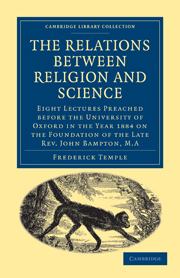 The Relations between Religion and Science
The Relations between Religion and Science Book contents
- Frontmatter
- Contents
- LECTURE I THE ORIGIN AND NATURE OF SCIENTIFIC BELIEF
- LECTURE II THE ORIGIN AND NATURE OF RELIGIOUS BELIEF
- LECTURE III APPARENT CONFLICT BETWEEN SCIENCE AND RELIGION ON FREE-WILL
- LECTURE IV APPARENT CONFLICT BETWEEN RELIGION AND THE DOCTRINE OF EVOLUTION
- LECTURE V REVELATION THE MEANS OF DEVELOPING AND COMPLETING SPIRITUAL KNOWLEDGE
- LECTURE VI APPARENT COLLISION BETWEEN RELIGION AND THE DOCTRINE OF EVOLUTION
- LECTURE VII APPARENT COLLISION OF SCIENCE WITH THE CLAIM TO SUPERNATURAL POWER
- LECTURE VIII THE CONCLUSION OF THE ARGUMENT
LECTURE VI - APPARENT COLLISION BETWEEN RELIGION AND THE DOCTRINE OF EVOLUTION
Published online by Cambridge University Press: 29 August 2010
- Frontmatter
- Contents
- LECTURE I THE ORIGIN AND NATURE OF SCIENTIFIC BELIEF
- LECTURE II THE ORIGIN AND NATURE OF RELIGIOUS BELIEF
- LECTURE III APPARENT CONFLICT BETWEEN SCIENCE AND RELIGION ON FREE-WILL
- LECTURE IV APPARENT CONFLICT BETWEEN RELIGION AND THE DOCTRINE OF EVOLUTION
- LECTURE V REVELATION THE MEANS OF DEVELOPING AND COMPLETING SPIRITUAL KNOWLEDGE
- LECTURE VI APPARENT COLLISION BETWEEN RELIGION AND THE DOCTRINE OF EVOLUTION
- LECTURE VII APPARENT COLLISION OF SCIENCE WITH THE CLAIM TO SUPERNATURAL POWER
- LECTURE VIII THE CONCLUSION OF THE ARGUMENT
Summary
‘Know ye that the Lord He is God: it is He that hath made us, and not we ourselves.’
Psalm c. 3.RELIGION is rooted in our spiritual nature and its fundamental truths are as independent of experience for their hold on our consciences as the truths of mathematics for their hold on our reason.
But as a matter of fact Religion has taken the form of a revelation. And this introduces a new contact between Religion and Science, and of necessity a new possibility of collision. There is not only possible opposition or apparent opposition of Science in what is revealed, in what we may call the actual substance of the revelation; but also in the accessories and evidences of the revelation, which may be no actual part of the revelation itself, but nevertheless are, to all appearance, inseparably bound up with it. It is therefore no more than might have been expected that the general postulate of the uniformity of nature should appear to be contravened by the claim to supernatural power made on behalf of revelation, and that the special, but just at present leading scientific doctrine, the doctrine of Evolution, should be found inconsistent with parts, or what appear to be parts, of the revelation itself. And we have to consider the two questions, What has Eovelation to say concerning Evolution? and what has Science to say concerning Miracles?
- Type
- Chapter
- Information
- The Relations between Religion and ScienceEight Lectures Preached before the University of Oxford in the Year 1884 on the Foundation of the Late Rev. John Bampton, M.A., pp. 159 - 190Publisher: Cambridge University PressPrint publication year: 2009First published in: 1884


